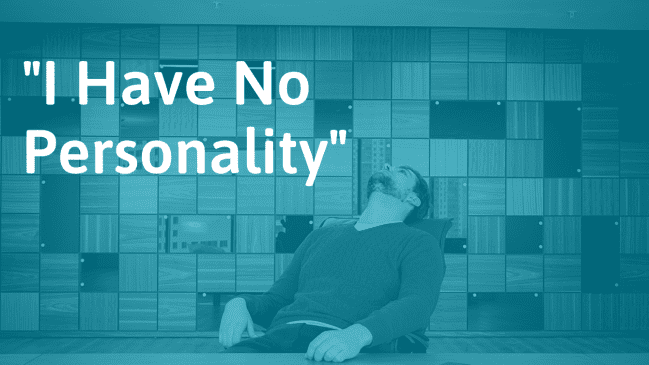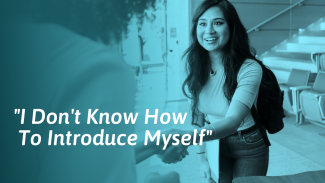“I never allow myself to explore and try new things, to build close emotional relationships, or to talk to new people. I struggle with low self-confidence and worrying about what other people may think. I feel like I don’t have any opinions to share. When I’m around others, I feel stunted, numb, powerless, and disconnected.”
If you can relate to this and would like to develop your personality but are not sure how, this guide gives you the tools to develop a more interesting personality and engage in more stimulating conversations.
Sections
- What it means to have no personality
- Debunking myths about having no personality
- Signs you may have no personality
- Why do I have no personality?
- How to develop your personality
What it means to have no personality
Saying someone has “no personality” isn’t really accurate, because everyone has their own unique traits and interests. The term is often used when someone seems boring, quiet, or not good at socializing. This can be due to shyness, feeling nervous around others, or low self-confidence. So, having “no personality” isn’t true; everyone has their own special character, but it might not always be easy to see or understand.
Debunking Myths About Having No Personality
It’s important to clear up some myths about having no personality. Let’s look at these myths and uncover a more realistic look at them.
Myth 1: “No personality” means you’re boring or unlikable.
Truth: Everyone has a unique personality, even if it’s not always easy to see. Feeling like you have no personality might be because you’re shy or quiet, but that doesn’t make you boring or unlikable. Your qualities can still be interesting and appealing to others.
Myth 2: You can’t change your personality.
Truth: Although some aspects of your personality may be harder to change, personal growth and development are possible. With consistent effort and time, you can build a more engaging and dynamic personality.
Myth 3: People with no personality don’t have any interests or hobbies.
Truth: Even if you feel like you have no personality, you might have interests or hobbies that you don’t openly share with others. Exploring new activities and passions can help you uncover what you genuinely enjoy and bring out your personality.
Myth 4: If you have no personality, you can’t make friends.
Truth: Building friendships takes time, effort, and patience. By improving your social skills, being open to meeting new people, and genuinely connecting with others, you can form meaningful relationships, even if you feel like you have no personality.
Myth 5: Only outgoing people have strong personalities.
Truth: Both introverts and extroverts can have captivating personalities. Embrace your unique qualities, express yourself authentically, and let your personality shine, regardless of whether you’re introverted or extroverted.
Myth 6: Having no personality means you lack opinions or beliefs.
Truth: You may have opinions and beliefs that you’re not comfortable sharing, or you might be unsure of your stance on certain topics. Developing your opinions and beliefs, and learning to express them, can help enrich your personality.
Understanding the truth behind these myths is crucial. You have a personality, and with some work and self-awareness, you can let it shine and grow.
Signs you may have no personality
Everyone can develop a captivating social personality while staying true to themselves, but it comes more naturally to certain people than to others. If you question whether you lack personality, consider if you have experienced these scenarios:
- Do you struggle with showing an understanding of things from various perspectives, making light of a situation, and making jokes that other people genuinely find amusing?
- Do you often feel blank, emotionless, and speak in a monotone?
- Do you tend not to have your own opinions and just follow along?
- Do you tend to be negative and bored?
- Do you feel blank, and as though you do not have anything to contribute?
It’s important to recognize that nobody truly lacks a personality, even if it might feel that way at times. Each individual has their own unique blend of traits, characteristics, and preferences that make up their personality. What may appear as a “lack” of personality could be a manifestation of social anxiety, introversion, or simply a more reserved nature.
Don’t worry if you feel like you have no personality. It doesn’t mean you’re broken or boring. Use this as a chance to grow and improve. Working on any underlying issues will help your personality show itself in a better light. Personal growth is an ongoing process, and everyone can make their personality more appealing.
Why do I have no personality?
When we doubt ourselves, we tend to feel reserved, helpless, and weak. We may become silent, disconnected, or passive as we retreat into our shells to avoid undesirable situations and interactions with others.
We may feel vulnerable and our bodies may shut down to protect us emotionally, which then exacerbates our insecurities and inhibitions. Here are a few reasons why we may struggle with letting our personalities shine:
- We tend to ground our self-worth in how we think others see us. If we were mocked and bullied when we were younger, then we may feel like people look down on us, even decades later.
- You might have labeled yourself as awkward or inadequate and may have a hard time getting out of that role.
- Perhaps you put other people on pedestals, meaning, you elevate their status but not yours. This can lead to following others and being too afraid to walk your own path.
- Feeling intimidated by others. Our confidence fluctuates throughout the day according to what we are doing, where we are, who we are with, and how comfortable we feel being our authentic selves. Our confidence particularly wanes around people we want to impress or who we feel are judging us.
- Depression can make us think negatively about ourselves and lack the motivation to do things or engage with others.
How to develop your personality
From watching youtube videos to taking an improv acting class, there are various ways to help you grow. You need to identify what works best for you. Whenever you feel yourself holding back, pause, and remember how you will feel if you were to achieve your goals. It will be uncomfortable, but by growing your self-confidence, living more passionately, partaking in activities you enjoy, and sharing the spotlight, you can improve your personality and live a more fulfilling life.
Here’s how to get a more attractive, fascinating personality:
1. Learn methods to overcome self-doubt
Your anxiety may cause you to overthink and become self-conscious. Our negative thoughts often stem from core beliefs that we have had about ourselves ever since we were children and form the lenses through which we perceive ourselves, others, and situations today.
Self-doubt can make us less motivated to socialize, live our best lives, and develop our personalities. Instead, to help you become more confident:
- Dig deeper into the reasons behind your feelings and thoughts. Reflect on why you feel your emotions, think your thoughts, and behave the way you do.
- Create a list of ten qualities you love about your life and ten things about your life that you are thankful for. Continue to review and add to this list every day. Whenever you doubt yourself, turn to this list.
- Prioritize your own self-care so that you will feel more comfortable in the spotlight.
- Stop comparing yourself to others. We each have our own stories, journeys, and purpose.
2. Connect with like-minded people
Consider joining Meetup.com, Facebook, and other social groups of people who share similar interests and who understand you. Practice engaging your new friends in conversations and enjoy your hobbies together.
See our guide on how to find like-minded people.
3. Take initiatives
Become more assertive, respectfully take up more space, and take action even when you do not want to. Start sharing and going up to people to strike conversations, rather than waiting for them to come to you.
4. Share what’s on your mind
If you are held back by worrying about what others may think, try sharing what’s on your mind, even if it’s uncomfortable. Other people may want to know your thoughts and opinions. It is okay to respectfully disagree as that is what helps broaden perspectives. If it feels scary, take small steps:
“I really like this song.”
“I am excited to….”
5. Make your conversations more interesting
“I’m boring. How can I make my conversations more interesting?”
Conversations are about bonding, talking, and listening. You may find it difficult to get past the small talk and keep other people emotionally and intellectually engaged. So, after the person you would like to chat with responds to your initial statement, then try asking open-ended questions that encourage them to talk about themselves. For example, you may consider beginning the open-ended questions with:
- What was the best part of…
- What was the hardest part about…
- How did you feel about…
- How did you know…
- What surprised you about…
- Why do you want…
- What was it like to…
Pay close attention to what they are telling you. It’s rare to have someone truly listen, and it helps you stand out. When they’re done sharing, convey your thoughts and reflections about what they said. This helps them paint a picture of you.
This type of back-and-forth conversation has been shown to make conversations more engaging and increase closeness.[1]
Read our article on how to not be boring and how to make interesting conversation.
6. Practice your storytelling skills
When you share stories, are the stories long-winded, do you get off track, repeat yourself, or blank out?
This can be difficult for other people to follow, and they may become bored. Pay attention to if they seem engaged or if they are simply nodding to be polite. Accepting that you may have a boring or dry personality is half the battle. It is also essential to understand why that is the case and then to work on developing yourself.
Here are a few other ideas to help you share compelling stories.
7. Acknowledge that you want to change
Here’s an exercise to help you gauge your progress: take three deep breaths in and out to relax. Close your eyes. Meditate and reflect on how you are feeling right now. If you read this article and agreed with some of the signs mentioned, that is wonderful. That means you are ready to accept that you are not living your best life. Accepting your current situation is an important first to change, and you can now set up your goals:
8. Create personality goals
Consider the qualities you admire about other people’s personalities. Create goals for yourself related to what you will do to develop your personality.
- Reflect and create opinions about what you hear, feel, see, and do.
- If you wish to expose yourself to new perspectives, then try beginning with watching movies and shows outside your comfort zone, listening to hilarious podcasts, reading books and magazines, or talking to people you otherwise would not have.
- Embrace gratitude, remind yourself that you are worthy, and love yourself to build your self-confidence.
- Practice your new communication and social skills by going up to people, calling old friends, and meeting new groups.











I really feel none of this should be framed as “having no personality”. You refute the statement in the beginning but then go on to use those same words 22 times in the article. Subconsciously reinforcing the idea that just shouldnt exist as you say.
It’s really hard to develop a new personality and you don’t even know who you are in the beginning. I’m tired of being everybody else and now in therapy. The hardest thing I ever done in my life, 47 years old and still have no clue what my purpose is, Only GOD can help me and of yes he told me to go to therapy. People do think I’m boring and don’t like me, I’m working on liking myself more, I will do what I do best and fake it!
It’s not about personality: it’s about our awareness of how we construct our thinking in the moment. Check out Constructed Development Theory by Stevens (2020) for more on this. Everything in the article can be explained from the position of Intention, Awareness, Choice and Response.
To me, “no personality” means having a boring personality more than having none.
I thought I have a whole bunch of personalities. Turns out I had none so I just copy other people’s personality. Also, this is a bit too accurate. Must be the work of aliens.